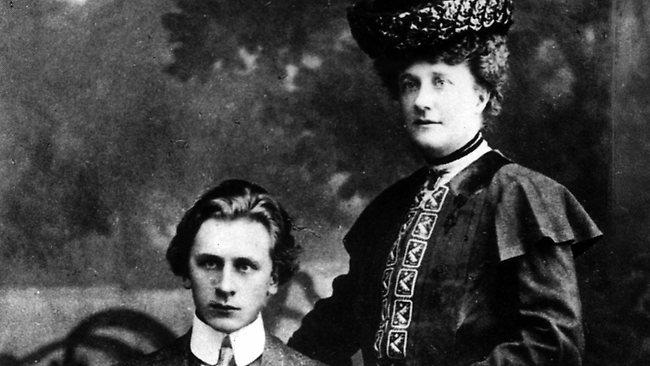Stephen Orr's novel Dissonance dissects a mother's love
STEPHEN Orr's compelling new novel, Dissonance, reminds us tiger parenting is nothing new, and not the exclusive province of Asian traditions.

RECENTLY, we have pondered the sort of mad, bad mothering recommended by American author Amy Chua in Battle Hymn of the Tiger Mother.
Chua espouses a belief, derived from her Chinese cultural heritage, that a child's best preparation for life lies in parental whip-cracking, an approach that seems abusive in comparison to the permissive attitudes that prevail.
Yet, to join the elite in any field, relentless practice, discipline and a willingness to forgo fun are essential. We may live in a society more open to this level of commitment in sport than art, but tiger parenting is nothing new, and not the exclusive province of Asian traditions, as Stephen Orr's compelling new novel, Dissonance, reminds us.
The temptation for parents to exclude a child from the ordinary distractions of growing up and "support" them to go hell-for-leather (and perhaps lucratively) in the direction of their exceptional talents must be hard to resist. The opposite, of course, could be worse: the stunting of great potential through ignorance, envy, discrimination or poverty. The tortured dynamics that can exist between a parent and a child prodigy are familiar from David Helfgott's story and the movie based on it, Shine. Orr's novel taps into that same nexus between fragile, Promethean genius and brutal parental control.
Orr's focus in Dissonance on the rigours and ecstasies of musical ambition is interesting, but the conflict between aspiration and the emotional mess that happens around it is enthralling. A big contributor to that mess is the thwarted ambition of talented mothers and wives. Fanatical maternal dominance lies at the heart of this novel.
Dissonance is touted as a "re-imagining" of the years spent in Frankfurt by Australian pianist and composer Percy Grainger and his mother Rose. However, this should be loosely understood.
Orr has previously proposed that research is as overrated for storytellers now as it was for Shakespeare. He has not had the time or resources to achieve flawless accuracy. Time's Long Ruin, his earlier novel, which was critically acclaimed and shortlisted for the Miles Franklin and Commonwealth Writers prizes, was based on the 1966 disappearance of the Beaumont children in South Australia. Orr's method is to extract a perplexing strand from the archival weft and weave it into a fiction equal to anything facts might offer.
Dissonance is not about Grainger in any precise sense. For starters, Percy Grainger had a classier upbringing in Melbourne than the tough rural background created by Orr for his young pianist. However, Rose Grainger was a species of Aussie tiger mother who craved control of her son and his gift.
Orr invents Erwin Hergert, who is caught up in a similar, archetypal struggle with his mum Madge. He is forced by Madge's literal whip-cracking to follow the path of the musical prodigy. She makes Erwin's father live in the shed to stop him getting in the way of piano practice.
Dissonance recalls a time when talented Australian artists felt the bar was set stratospherically high because of their colonial status. They suffered from the belief that talent should go to, be measured against, or come from the imperial centre. This dilemma has been (and still is?) part of our story.
Madge ships herself and Erwin off to Europe, where he must prove himself against the world's best. This was the trajectory followed by Helfgott and Grainger. Having survived his impoverished upbringing in the Barossa Valley, practising for hours on end, Erwin finds himself in pre-war Hamburg, training with an eminent and sexually predatory professor.
Erwin falls in love with Luise, a gifted German singer. She becomes pregnant, they marry and domestic life bears down with all its capacity to destroy artistic ambition; if it proves difficult for Erwin, it spells doom for Luise.
As Madge watches them fall in love, her determination becomes frantic. When Erwin is called up to fight, mother and daughter-in-law are locked into a bitter battle. Wartime deprivations, household squabbles and musical frustrations are relegated, though, to lesser significance by the chilling brutality of growing Nazi aggression.
Orr cleverly keeps the war in the family's peripheral vision. As Australians, the Hergerts do not feel it is their war. Its atrocities creep up on them, from behind colourful parades and a hedge of everyday concerns. Intimations of the Holocaust arrive in the outlawing of music by Jewish composers and the persecution of Erwin's teachers.
Orr is a no-nonsense, vivid storyteller. He punches out exchanges between his characters in a pragmatic way that transmits jealousy and heartbreak without sentiment or nuance. His style is suited to the exigencies of war, where the trashing of what is precious, the beloved body mangled on a street or in a bomb blast, can only be accepted with resignation. There are, though, glimpses of sad complexity that bring us up short; we admire Madge, just when we feel most repelled.
This is an engrossing novel, evoking the looming tragedy of lost promise. At its heart is a maternal hubris, heroic and horrible.
Dissonance: A Novel
By Stephen Orr
Wakefield Press, 408pp, $27.95
Stella Clarke has lectured on cultural and literary studies in Britain and Australia.


